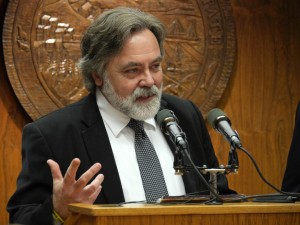Governor Bill Walker’s administration wants to borrow money to pay for public workers’ pensions, by selling up to 3.3 billion dollars in what are known as pension obligation bonds. The plan is drawing concern from lawmakers, who say it may be risky.

Alaska’s government is obligated to pay public workers 6 billion dollars more in future pensions than it has in assets.
State Revenue Commissioner Randall Hoffbeck says the best way to close that gap is to sell pension obligation bonds.
During a Senate Finance Committee meeting Thursday, Hoffbeck said the state would pay less than 4 percent interest per year for the bonds.
“Your returns are not within your control, but your cost of debt is. And we have historically low costs of debt,” Hoffbeck said.
The bonds are essentially low-interest debt. The state would use that money to invest. If investment returns are higher than the bonds’ rate, then the state would save money.
A 2008 law allows the administration to issue the bonds without legislative approval. But the Legislature would have to decide to spend the money to pay off the bonds.
Wasilla Republican Senator Mike Dunleavy questioned why the administration planned to sell the bonds at a time when the Legislature is out of session and in the middle of an election campaign.
“You know, many times, we as individuals do more due diligence on buying a toaster than we do on such money movements at such a magnitude that we do in the state,” Dunleavy said. “It doesn’t make any sense to me.”
Hoffbeck said the timing is due to low interest rates. And he cautioned against waiting any longer, since interest rates have risen since earlier in the summer. He says that if legislators say they won’t appropriate the money, the state may not find buyers for the bonds.
Dunleavy asked for more time to weigh the proposal.
“There’s some that say that just by having this discussion, will cause uncertainty amongst those dealing with the bonds and the interest rates may go up,” Dunleavy said. “My response to that is: There should be scrutiny. And anyone that’s not asking the questions that are in a similar position that I am, they need to be asking the questions.”
Pension obligation bonds have drawn criticism nationally. The Government Finance Officers Association says they involve considerable investment risk. It recommends against state and local governments issuing the bonds, since investing the money may not earn more than the bond payments.
Association Director Stephen Gauthier told the Finance Committee the bonds have a history in recent decades of failing to benefit governments.
“They frequently fail. Matter of fact, until 2009, most of them failed,” Gauthier said. “Now, you know, there’s more winners than losers, but still it’s pretty risky business. And it often attracts governments who are in the least position to take those kinds of risks.”
The Department of Revenue projects that the state will save slightly more than a billion dollars over the 23-year life of the bond, if investments earn 7 percent.
Hoffbeck said if everything goes according to plan, the bonds will be priced the week of October 24th, with bond sales closing the week of October 31st.
Andrew Kitchenman is the state government and politics reporter for Alaska Public Media and KTOO in Juneau. Reach him at akitchenman@alaskapublic.org.




